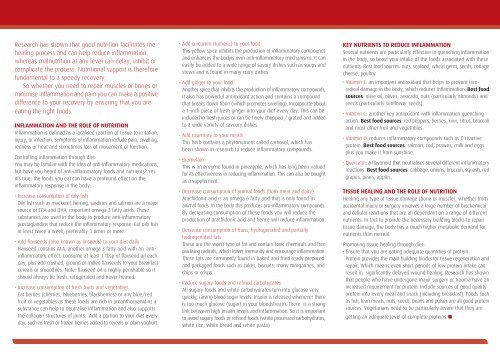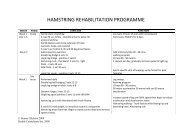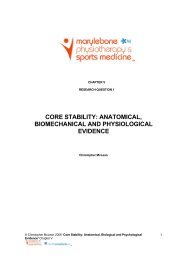Nutrition and Tissue Healing - Marylebone Physiotherapy
Nutrition and Tissue Healing - Marylebone Physiotherapy
Nutrition and Tissue Healing - Marylebone Physiotherapy
Create successful ePaper yourself
Turn your PDF publications into a flip-book with our unique Google optimized e-Paper software.
Research has shown that good nutrition facilitates the<br />
healing process <strong>and</strong> can help reduce inflammation,<br />
whereas malnutrition at any level can delay, inhibit or<br />
complicate the process. <strong>Nutrition</strong>al support is therefore<br />
fundamental to a speedy recovery.<br />
So whether you need to repair muscles or bones or<br />
minimise inflammation <strong>and</strong> pain you can make a positive<br />
difference to your recovery by ensuring that you are<br />
eating the right foods.<br />
INFLAMMATION AND THE ROLE OF NUTRITION<br />
Inflammation is defined as a localised reaction of tissue to irritation,<br />
injury, or infection. Symptoms of inflammation include pain, swelling,<br />
redness or heat <strong>and</strong> sometimes loss of movement or function.<br />
Controlling inflammation through diet:<br />
You may be familiar with the idea of anti-inflammatory medications,<br />
but have you heard of anti-inflammatory foods <strong>and</strong> nutrients? Yes<br />
itís true; the foods you eat can have a profound effect on the<br />
inflammatory response in the body:<br />
• Increase consumption of oily fish<br />
Oily fish such as mackerel, herring, sardines <strong>and</strong> salmon are a major<br />
source of EPA <strong>and</strong> DHA, important omega 3 fatty acids. These<br />
substances are used in the body to produce anti-inflammatory<br />
prostagl<strong>and</strong>ins that reduce the inflammatory response. Eat oily fish<br />
at least twice a week, preferably 3 times or more.<br />
• Add flaxseeds (also known as linseeds) to your diet daily<br />
Flaxseed contains ALA, another omega 3 fatty acid with an antiinflammatory<br />
effect. Consume at least 1 tbsp of flaxseed oil each<br />
day, plus add crushed, ground or milled flaxseeds to your breakfast<br />
cereals or smoothies. Note: flaxseed oil is highly perishable so it<br />
should always be fresh, refrigerated <strong>and</strong> never heated.<br />
• Increase consumption of fresh fruits <strong>and</strong> vegetables<br />
Eat berries (cherries, blueberries, blackberries) or any blue/red<br />
fruit or vegetables as these foods are rich in proanthocyanidins a<br />
substance can help to neutralise inflammation <strong>and</strong> also supports<br />
the collagen structures of joints. Add a portion to your diet every<br />
day, such as fresh or frozen berries added to cereals or plain yoghurt.<br />
• Add curcumin (tumeric) to your food<br />
This yellow spice inhibits the production of inflammatory compounds<br />
<strong>and</strong> enhances the bodyís own anti-inflammatory mechanisms. It can<br />
easily be added to a wide range of savory dishes such as soups <strong>and</strong><br />
stews <strong>and</strong> is found in many curry dishes.<br />
• Add ginger to your food<br />
Another spice that inhibits the production of inflammatory compounds,<br />
it also has powerful antioxidant action <strong>and</strong> contains a compound<br />
that breaks down fibrin (which promotes swelling). Incorporate about<br />
a 1-inch piece of fresh ginger into your diet every day. This can be<br />
included in fresh juices or can be finely chopped / grated <strong>and</strong> added<br />
to a wide variety of savoury dishes.<br />
• Add rosemary to your meals<br />
This herb contains a phytonutrient called carnosol, which has<br />
been shown in research to reduce inflammatory compounds.<br />
• Bromelain<br />
This is an enzyme found in pineapple, which has long been valued<br />
for its effectiveness in reducing inflammation. This can also be bought<br />
as a supplement.<br />
• Decrease consumption of animal foods (both meat <strong>and</strong> dairy)<br />
Arachidonic acid is an omega 6 fatty acid that is only found in<br />
animal foods. In the body this produces pro-inflammatory compounds.<br />
By decreasing consumption of these foods you will reduce the<br />
production of arachidonic acid <strong>and</strong> hence will reduce inflammation.<br />
• Decrease consumption of trans, hydrogenated <strong>and</strong> partially<br />
hydrogenated fats<br />
These are the worst type of fat <strong>and</strong> contain toxic chemicals <strong>and</strong> free<br />
oxidising radicals, which lower immunity <strong>and</strong> encourage inflammation.<br />
These fats are commonly found in baked <strong>and</strong> fried ready prepared<br />
<strong>and</strong> packaged foods such as cakes, biscuits, many margarines, <strong>and</strong><br />
chips or crisps.<br />
• Reduce sugary foods <strong>and</strong> refined carbohyrates<br />
All sugary foods <strong>and</strong> white carbohydrates turn into glucose very<br />
quickly, raising blood sugar levels. Insulin is released whenever there<br />
is too much glucose (sugar) in your bloodstream. There is a strong<br />
link between high insulin levels <strong>and</strong> inflammation. So it is important<br />
to avoid sugary foods or refined foods (white processed carbohydrates,<br />
white rice, white bread <strong>and</strong> white pasta)<br />
KEY NUTRIENTS TO REDUCE INFLAMMATION<br />
Several nutrients are particularly effective in quenching inflammation<br />
in the body, so boost your intake of the foods associated with these<br />
nutrients: Best food sources: nuts, seafood, wheat germ, seeds, cottage<br />
cheese, poultry<br />
• Vitamin E: an important antioxidant that helps to prevent freeradical<br />
damage in the body, which reduces inflammation. Best food<br />
sources: olive oil, olives, avocado, nuts (particularly almonds) <strong>and</strong><br />
seeds (particularly sunflower seeds).<br />
• Vitamin C: another key antioxidant with inflammation quenching<br />
action. Best food sources: red peppers, berries, kiwi, citrus, broccoli<br />
<strong>and</strong> most other fruit <strong>and</strong> vegetables.<br />
• Vitamin D: reduces inflammatory compounds such as C-reactive<br />
protein. Best food sources: salmon, cod, prawns, milk <strong>and</strong> eggs<br />
plus you make it from sunshine.<br />
• Quercetin: a flavonoid that neutralises several different inflammatory<br />
reactions. Best food sources: cabbage, onions, broccoli, squash, red<br />
grapes, pears, apples.<br />
TISSUE HEALING AND THE ROLE OF NUTRITION<br />
<strong>Healing</strong> any type of tissue damage (bone or muscle), whether from<br />
accidental injury or surgery involves a large number of biochemical<br />
<strong>and</strong> cellular reactions that are all dependant on a range of different<br />
nutrients. In fact to provide the necessary building blocks to repair<br />
tissue damage, the body has a much higher metabolic dem<strong>and</strong> for<br />
nutrients than normal.<br />
Promoting tissue healing through diet:<br />
• Ensure that you are eating adequate quantities of protein<br />
Protein provides the main building blocks for tissue regeneration <strong>and</strong><br />
repair. Which means even short periods of low protein intake can<br />
result in significantly delayed wound healing. Research has shown<br />
that people who have undergone major surgery or trauma have an<br />
increased requirement for protein. Include sources of good quality<br />
protein into every meal <strong>and</strong> snack (including breakfast). Foods such<br />
as fish, lean meats, nuts, seeds, beans <strong>and</strong> pulses are all good protein<br />
sources. Vegetarians need to be particularly aware that they are<br />
getting an adequate level of complete proteins.





